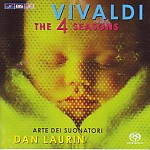Virtuoso recorder player Dan Laurin makes a very interesting point about recent performances of The Four Seasons, citing Nikolaus Harnoncourt’s revelatory demonstration of the music’s programmatic content as the source of a continuing attempt, mostly by period-instrument groups, to treat the music ever more literally (and, he implies, crudely). In the process, Laurin suggests, much of the music’s elegance, style, and sheer musicality is lost. He’s undoubtedly correct in this assertion, and all of the qualities he sometimes finds missing can be found here in abundance. There is certainly no finer recorder player in the world: he copes with everything Vivaldi throws at him with joyous abandon–and lips of steel. Doubled notes, ornamental filigree, and the quickest passagework in the outer movements of all four concertos hold no terror for him, and he’s beautifully accompanied by the members of Arte Dei Suonatori.
In a sense, Laurin has an advantage over his violin-playing colleagues in that the recorder is a “natural” when it comes to things like the birdsong imitations in the first movement of “Spring”, or the whistling wind in the various evocations of atmospheric phenomena. But this advantage also is a disadvantage. If Laurin is correct in his view, part of the reason that Vivaldi allocated the solo part to the violin in the first place was because he wanted these various effects “evoked”, or stylized, and not imitated. So while the recorder may be great at the bird thing, it’s undeniably limited everywhere else. This is particularly true of the slow movements, which after all are arias. The sultry central movement of “Spring” or the charming skating scene in “Winter” need the kind of warmth and long-breathed lyricism characteristic of the violin, never mind the stringed instrument’s greater range of everything else: pitch, dynamics, and timbral variety.
The result, then, however stunningly played, can only be a partial realization of Vivaldi’s intentions, both expressive and programmatic. I have no such qualms about the three other items on the program. Although the Concerto in G major RV 437 originally was composed for transverse flute, the choice of recorder hardly matters, while the Concerto in C minor RV 441 is, as Laurin points out, one of the very greatest Baroque works in its medium. It’s also very nice to have RV 124, the Concerto in D major for strings, immaculately played and separating The Four Seasons from the remaining recorder concertos. Even Laurin seems willing to admit the need for some timbral contrast after so much music featuring his own instrument.
All discussions of aesthetics aside, you simply won’t find more intelligent or musical recorder playing anywhere, and if you’re a fan of the instrument this release will be essential listening. BIS complements the excellence of the performances with state-of-the-art engineering in both SACD multichannel and conventional stereo formats. I don’t for a moment believe that everyone will share my reservations about The Four Seasons, and perhaps they don’t matter all that much, but it seemed fair to raise them in light of Laurin’s interesting comments in the CD booklet, and I invite listeners to judge for themselves.
































